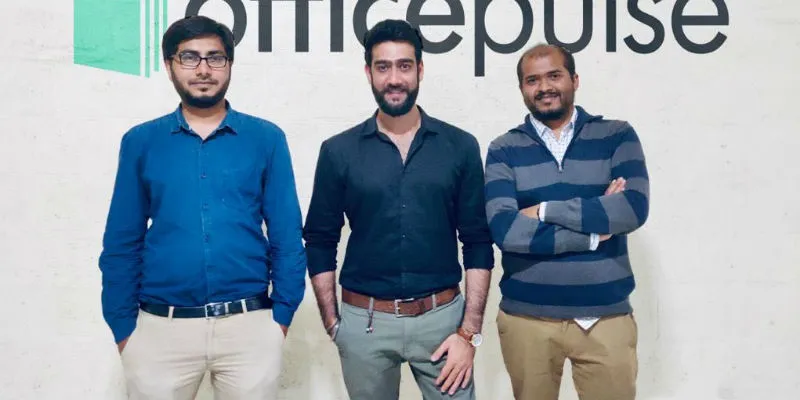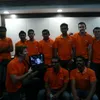Officepulse wants to be the one-stop platform for all your office supplies
Bengaluru-based Officepulse has scaled up to more than Rs 7 crore in revenue and has signed up over 40 customers in less than 18 months of operations. The B2B ecommerce startup aims to cover 40 cities cross India as it eyes further growth.
If you have ever set up an office, you would have 10 to 15 different vendors supplying you office essentials, including papers, pens, furniture, lighting, cleaning items, gifts, and coffee machines. You end up sourcing from various vendors and often unable to keep track of the costs involved. What if someone told you that there was a platform that could track all these expenses on a single dashboard and suggest the best vendor for you?
Launched in 2017 by Darshan Bathija, Pradeep Bhat, and Rahul Meena, Officepulse does just that.

Officepulse founders
Like most entrepreneurs, the startup bug bit the trio very hard in 2017. They were already in the startup community in Bengaluru. Pradeep Bhat was the Co-founder of Ardour Labs, Rahul Meena was with Tapzo, and Darshan Bathija was working in a corporate. Before starting up, Darshan was in the procurement technology and consulting domain. This gave him a strong headway into real-world corporate problems specific to procurement mapping, right from procuring raw materials to the indirect spectrum of spend.
When they met and brainstormed on platforms that could benefit the corporate industry, a common idea of providing office supplies culminated in Officepulse in December 2017.
"Officepulse is a business model that is true to our personal knowledge and corporate challenges. We are a B2B ecommerce company, assisting corporates to automate and source their complete array of office assets and consumables. Our categories include housekeeping, IT, pantry (F&B), and stationery," says Darshan Bathija, Co-founder of Officepulse.
The startup is an op-tech platform enabling businesses to bring efficiency in their assets and consumables procurement. It also offers its customers with multi-location delivery facilities across India. A web app lers corporates order their office supplies.
In less than a year, the company has clients such as WeWork, 91Springboard, Wildcraft, Tata Global Beverages, Furlenco, Capillary, etc., and has direct tie-ups with renowned brands such as Pepsico, Diversey, HP, Honeywell, Lenovo, Unibic, Nestle, Dabur, ITC, and Kimberly Clark, among others.
From day one, the trio has made sure that they are completely relevant in their approach to solving the needs of every office and business, be it a multinational enterprise or an SMB firm.
The early days
In the early days, Darshan spoke to a few of his contacts from his previous jobs, most of whom were heading the procurement or finance functions. These people explained the core challenges they faced when managing multiple sourcing plans, multiple SKUs, multiple locations, and multiple PRs, POs, and invoices. They also said that the reconciliation took longer than the actual sourcing activity, not to mention the quality, availability, cost parameters, and scattered data.
According to the team, it takes on a segregated market that is completely offline and carries low compliance. The founders took up the baton to solve this challenge with the right mix of planning and technology. It also involved extensive groundwork that included technology to solve the client’s office supplies sourcing. The platform rose to prominence in late 2018.
In early 2018, the startup did not have a team or a warehouse. The founders used their homes as warehouses, cars and bikes as delivery vehicles, and procured and delivered supplies themselves to each client.
At present, Officepulse leases warehouse spaces in every metro city. It also has a fleet of delivery trucks in each metro, and has a team of 51 employees supporting its clients.
"The ground-level work gave us explicit insights into the daily working of companies, which was imperative to reach this scale and more," Darshan says.
From Rs 30,000 a month in revenue in early 2018, the startup, in the financial year 2019, has earned $1 million. At present, Officepulse has a gross revenue base of half a million dollars a month, with closures already in the pipeline to touch a $1 million net monthly revenue by January 2020.
The company plans to scale up across 40 cities in India, and plans to raise a larger round of funding over the next 18 months.
The future of Officepulse
“The Indian office supplies market is highly unorganised, with nearly 95 percent of all procurement and sales falling into this category. Hence, there is a significant scope of growth for organised players based on policy changes, the need for accountability, and expense control by leading organisations and startups,” says Pushpamitra Das, Partner, Z Nation Lab, which has invested in Officepulse.
According to a report by Beroe Inc, the global office supply market is estimated to be $247 billion, with the Indian market estimated at $30 billion by 2020.
Currently, Officepulse supplies products across categories like pantry, IT and networking products, office stationery, housekeeping, and industrial appliances to its customers. The company plans to include office furniture and customised merchandising in its product basket, on the back of growing demand from its existing customers.
It also has an end-to-end logistics set up in Bengaluru, Delhi, and Mumbai, and has chalked out plans to expand its presence to 10 more cities by the end of FY19.
“Our tech-led approach has helped companies to ease the process of ordering supplies across departments, and cleared the chain of command with simplified ordering and approval process to bring in transparency,” Rahul says.
It's business model is to take a margin or cut from suppliers and charge companies for consolidating their office supplies.
Apart from Officepulse, the office supplies market has few other players like WorkStore, Amazon Business, and startups like Power2SME.
But Officepulse is sure it is a winner, and - with the current revenue growth - can become another sought-after startup emerging from India.
(Edited by Suman Singh)









